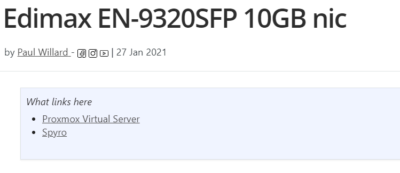I’ve had a project going on for a month or so to re-do a Confluence wiki into Markdown files, hence why I pusblished The Markdown Cheatsheet, and Jekyll categories based menu.
One thing that can be handy in a wiki is “back links” i.e. what other pages link to this page.
The Requirements
I want to automatically find, and display, all other pages in a Jekyll site that link to the existing page.
Ruby Plugin
Ok, so let’s just skip straight to the meaty bit 😂
In your Jekyll root directory, if you don’t already have a folder called _plugins then create one.
mkdir _pluginsLet’s create a file called _plugins/backlinks_generator.rb
class BackLinksGenerator < Jekyll::Generator
def generate(site)
all_notes = site.collections['docs'].docs
all_posts = site.posts.docs
all_pages = site.pages
all_docs = all_notes + all_posts + all_pages
# Identify backlinks and add them to each doc
all_docs.each do |current_note|
notes_linking_to_current_note = all_docs.filter do |e|
e.content.include?(current_note.url)
end
current_note.data['backlinks'] = notes_linking_to_current_note
end
end
endHere’s a brief run down of what the Ruby script does:
- Creates 3 arrays: all_notes (i.e. a collection), all_post, all_pages.
- Concatinates the 3 arrays into one larger array called all_docs.
- In the current page that Jekyll is processing, loop through the all_docs array and find out if there is a link to the current page.
- Store the found results in the page/post.data as an array called backlinks ( i.e. page.backlinks or post.backlinks)
Some CSS
Yeah, just so things look nice 😝
.backlink-box {
background-color: #fffdf7;
}
.backlink-box:before {
content: "What links here";
font-style: italic;
}
.backlink-box li {
line-height: 1em;
}The Jekyll layout
I learned quickly that everything seems to link to the home page (i.e. “/”).
So while writing a section in my layout I had to include an exclusion (i.e. {% if page.url != home.url %} )
Now each page has an array of backlinks, or doesn’t.
I’ll check if backlinks exists, by checking if it is greater than 0 (zero), and if it is, I can just loop through it !
{% assign home = site.html_pages | where: 'url', '/' | first %}
{% if page.url != home.url %}
{% if page.showbacklinks == true %}
{% if page.backlinks.size > 0 %}
<div class="backlink-box">
<ul>
{% for backlink in page.backlinks %}
<li><a href="{{ site.url }}{{ backlink.url }}">{{ backlink.title }}</a></li>
{% endfor %}
</ul>
</div>
{% endif %}
{% endif %}
{% endif %}Note:
You can disable showing the backlink on a per page / per post basis by using the front matter
—
showbacklinks: no
—
The Result
sweet screenshot goodness ….

1 Comment